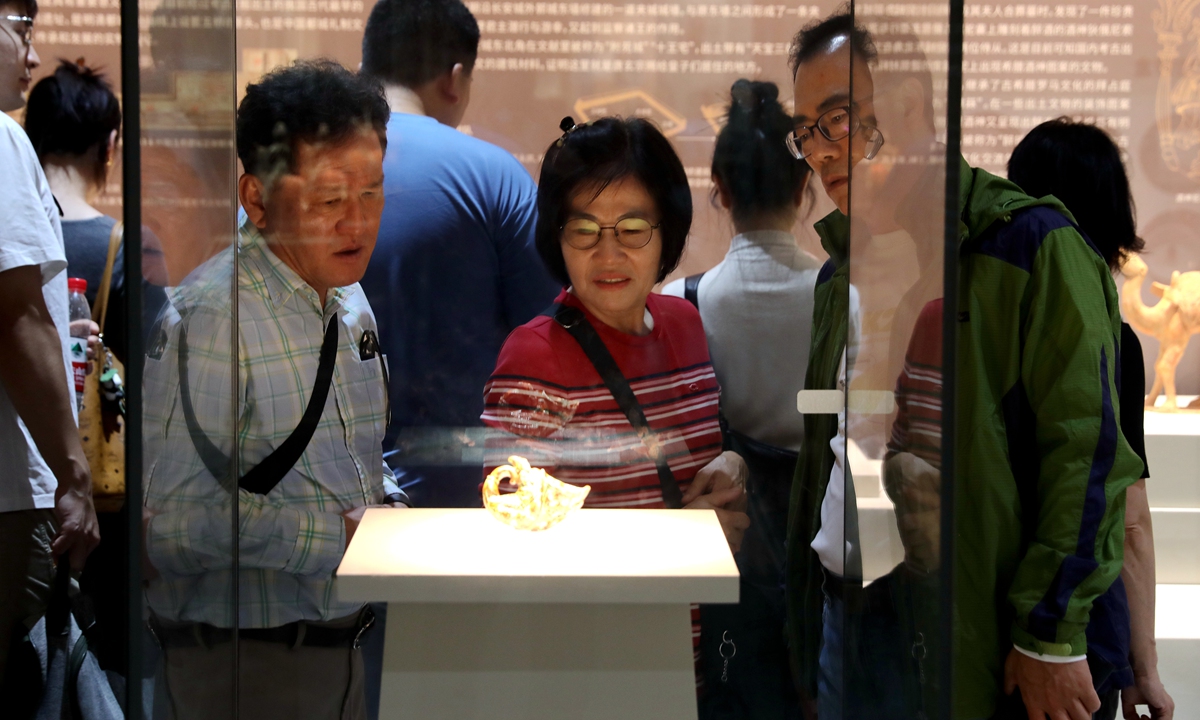
Visitors attend an exhibition showcasing 30 years of archaeological achievements in Xi'an, Northwest China's Shaanxi Province, on October 9, 2024. Photo: VCG
The third draft amendment to the Law on Protection of Cultural Relics was submitted for review at the 12th meeting of the Standing Committee of the 14th National People's Congress (NPC) on Monday. The draft specifies that the State Council's cultural relics administrative department will determine and publish the specific range of cultural relics prohibited from leaving the territory, according to China News Service.
The draft amendment also includes provisions encouraging citizens and organizations to legally collect cultural relics, as well as strengthening the guidance, management, and services for private collection activities.
"Previously, the National Cultural Heritage Administration and the Ministry of Culture and Tourism issued relevant regulations regarding the approval of cultural relics leaving the territory. This new draft amendment provides a unified standard for future national legislation," Huo Zhengxin, a law professor at the China University of Political Science and Law, told the Global Times.
He then added that the Article 79 of the second draft amendment of the law emphasized strengthening international cooperation in the field of cultural relics retrieval and repatriation.
"The third draft amendment will further promote the retrieval efforts of the administrative authorities, while also defining responsibilities for key departments," Huo said.
Some members of the 14th NPC Standing Committee have also pointed out that the relic identification system is a fundamental aspect of relic protection. However, the standards and methods for relic identification have yet to be established legally, leading to a lack of clarity in defining cultural relics, which hinders the proper execution of related work. Thus, the Standing Committee suggested enhancing the relic identification system to improve the rule of law in cultural relic protection.
In response, the draft amendment stipulates that the subjects, standards, and procedures for relic identification will be determined and published by the State Council.
"The standards for cultural relic appraisal are quite detailed and are more suited for specific regulations set forth by the State Council's administrative regulations based on departmental rules. This also provides more concrete legislative support for the further development of more operational standards by the authorities," Huo said.
The draft amendment states that cultural relic collection units must fulfill their due diligence obligations and verify the legality of the sources for any cultural relics they intend to acquire or purchase.
Additionally, some members of the Standing Committee, and a number of NPC deputies and local communities have emphasized the important role of private collection activities in the protection and utilization of cultural relics and in preserving and passing down excellent traditional Chinese culture.
To address this, the draft amendment includes provisions encouraging citizens and organizations to engage in legal collection, while also enhancing guidance, management, and services for private collections.
Huo noted that this provision is a measure to protect private cultural relics and it is primarily aimed at strengthening guidelines for private cultural artifacts. The provision is also related to the recent inconsistency in programs and activities such as live-streamed relic appraisals, some of which have resulted in damage to cultural relics.




